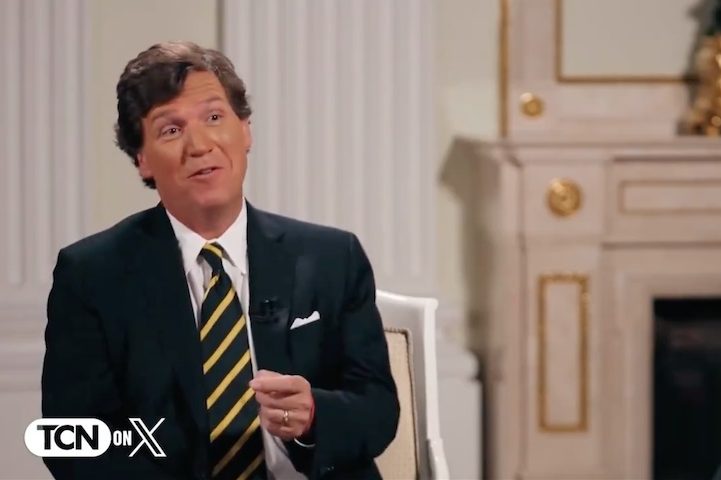They say that he who sups with the devil should have a long spoon. But, driven by vanity and unconstrained by any understanding of Russia’s history or politics, Tucker Carlson slurped up the intoxicating broth of Vladimir Putin’s falsifications this week in his interview with the Russian president.
Carlson took to Moscow well. His Russian hosts rolled out the red carpet, fawning over him with an admiration and servility that betrayed their sense of exasperation at being long shunned by the West. They saw him as a glittering American Prometheus who might just be gullible enough to take the fire of Russian disinformation back home.
It was not the first time Putin has played this trick on his interlocutors
Putin was different from his lieutenants. He didn’t try to humor Carlson and, on occasion, even seemed to be mocking him. He began the two-hour interview with a long foray into Russian history. Like a teacher instructing a pupil, he lectured Carlson about the founding of the Ryurik dynasty (862 AD), the baptism of Rus (988 AD), the exploits of Yaroslav the Wise (977-1054AD), and the Mongol conquests (1237-1241 AD). At one point, Putin signaled an assistant who brought in a gray folder which, he said, contained letters from the Ukrainian Hetman Bohdan Khmelnytsky to Warsaw and Moscow, including his letter to the czar, asking for the latter’s military protection of Ukraine.
It was not the first time Putin has played this trick on his interlocutors. He delights in posing as Russia’s historian-in-chief, and frequently appeals to widely known though carefully pre-selected documents, which he draws upon to defend his deeply flawed grand historical narratives. A better trained interlocutor would have challenged Putin’s reading of history, and, in particular, how anyone’s seventeenth century letters could serve as a useful starting point for annexing a neighboring country in the twenty-first century. Carlson, though, took the lesson in stride, though his bewildered gaze and half-hearted attempts to interrupt Putin suggested he had not expected such a long history lesson.
Carlson did not interrupt when Putin blamed Poland for precipitating World War Two by failing to peacefully surrender its territory to Adolf Hitler. The Poles, Putin said, “forced” Hitler to attack them because they failed to negotiate. “Hitler had nothing left to do but to start implementing his plan with Poland.”
Carlson should have pointed out to Putin that Hitler’s predicament could well be applied to Putin himself, for he, too, had spoken repeatedly of having no choice but to invade Ukraine, seeing that it had failed to peacefully surrender its territory to soothe his imperialist ambitions. Carlson, however, let Putin’s bizarre historical revisionism stand unchallenged and even nodded his head at the end of the diatribe, adding: “right.”
Wrong. The fact that Putin spent so much time of this interview delving into the ancient and not so ancient past shows just how obsessed he is about history. This is not history for history’s sake, of course. Putin is obsessed about history because he took to heart the Party’s slogan from George Orwell’s Nineteen Eighty-Four. “Who controls the past, controls the future.”!It’s the future that Putin wants: one where Ukraine, if it exists at all, is merely an appendage to the great Russian state.
Putin’s historical exposition included more recent episodes, too. He reminded Carlson of James Baker’s February 1990 promise not to enlarge NATO even one inch to the East, a promise discussed extensively by historians, not least by my colleague at the School of Advanced International Studies, Mary Sarotte, whose book, Not One Inch, recounts the story in excruciating detail.
Between Sarotte’s book and my own forthcoming history of the Cold War, To Run the World: the Kremlin’s Cold War Bid for Global Power, we now have a very nuanced understanding of what exactly happened in February 1990, and how Baker’s promise was not much of a promise at all. We also know that Gorbachev never did actually accept Baker’s “deal.” Instead he accepted an agreement that did allow for NATO’s eastward enlargement.
All of this is so well known that anyone with any sense of relevant historical knowledge would have found it incredibly easy to contradict Putin and put him back in his place. Putin is an authoritarian ruler who has blatantly invaded a neighboring state and is presently seeking to find excuses for his imperialism by falsifying history. Carlson did not challenge this, of course. Maybe that wasn’t the purpose of this interview. What then was its aim?
Perhaps it was to attain peace in Ukraine — peace through negotiations. Carlson broached this subject and Putin seemed receptive to peace talks. It would be so easy to end this war, he averred. All the United States has to do is stop providing weapons to Kyiv. “Everything will be finished in a few weeks. That’s it.”
The tsar will magnanimously forgive the West and allow the Americans to back away in a show of respect and deference. The Ukrainians will have to stay behind though for another of Putin’s history lessons. Only, without documents in gray folders. Just unrestrained force.
This article was originally published on The Spectator’s UK website.


























Leave a Reply